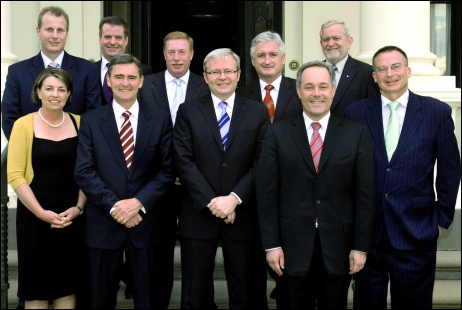Australian Local Government Association President, Councillor Paul Bell, outlines what’s in store for Local Government in 2008.
I find the four ‘Fs’ – Fair Funding, Fair Treatment, Formal Recognition and Future Challenges (Water and Climate Change) – a handy summary of the challenges facing Local Government and the communities we represent. These were detailed in the Australian Local Government Association (ALGA) document for the Federal Election,
‘A 10-Point Plan for Local Communities,’ which is available at www.alga.asn.au
The election year provided an opportunity for ALGA to promote the Local Government agenda. The work done through the National Local Roads and Transport Congress on producing a long term strategy helped to secure road funding and ensure that the Federal Government acknowledges the need for a whole of government approach to improving urban transport services and infrastructure.
We welcome Labor’s commitment to maintaining the Roads to Recovery and AusLink Strategic Regional Programs and to consider expanding Roads to Recovery grants to encompass public transport related projects like bus stations. There have also been encouraging signs from the new Labor Government of an awareness of broader Local Government infrastructure and financial viability issues and ALGA will continue to build on this awareness, including the need to upgrade community infrastructure, through its involvement in Council of Australian Governments (COAG) and representation on 14 Ministerial Councils.
The PricewaterhouseCoopers report into Local Government financing recommended revising the escalation methodology for Financial Assistance Grants, which have steadily declined from 1.01 per cent in 1996 to the current level of 0.76 per cent. This is an issue of fairness. Local Government does not have a sufficient direct funding stream and will continue to push for at least one per cent of direct taxation revenue.
ALGA was pleased to receive a response from Federal Labor identifying five key aspects of a Labor Government’s policy towards Local Government, including support for Constitutional recognition of Local Government, the creation of a new Council of Australian Local Government, fiscal reform (including the opportunity to look at Local Government funding), infrastructure renewal through Infrastructure Australia and a more collaborative approach to working with Local Government.
ALGA will play an important role in the new COAG arrangements which emerged from the first meeting chaired by Prime Minister Kevin Rudd, held in Melbourne on 20 December 2007. The meeting, which
I attended, agreed that COAG will move to a new, more collaborative method of operation with seven working groups dealing with major issues during 2008. ALGA will be represented on three of the most important groups for Local Government: infrastructure,
housing, and climate change and water.
The third ‘F’ – Formal Recognition – is one of Local Government’s most cherished goals and 2008 provides a crucial opportunity to finally achieve our rightful place at the table of Federalism as an equal partner with the States and Commonwealth. ALGA will work hard with the State and Territory Associations to ensure that we, firstly, have a unified approach and, secondly, present a coordinated and coherent case for change to the Australian people.
After two unsuccessful referendums, we must get it right. To this end, the ALGA Board agreed that a National Local Constitutional Summit would be held in Canberra at the end of 2008. That summit will provide the opportunity for Local Government to agree on the nature and form of Constitutional recognition.
Hold tightly onto your seats – 2008 will be an
exciting year! I look forward to your support and
assistance for our endeavours to help Local Government deliver the best results for the communities we serve.








